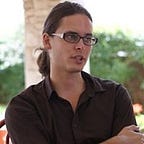Living On the Edge
Everyone wants to leave a mark in this world. People find meaning in various things, big and small. Some people dream of space travel and seriously plan to invade Mars. Others look forward to count snowdrop flowers in their garden once the spring comes.
Living on the edge doesn’t mean living dangerously or frantically, like a rock star. It even doesn’t mean living outside one’s comfort zone. Financial investors are constantly looking for something they call an edge. Some exclusive information or hidden pattern that will allow them to beat the market and achieve above average results.
Imagine you are lost for the second day in a vast desert where sun violently burns your skin and the hot breeze doesn’t give you any relief but instead it feels like salt in your open wounds. Now suddenly you see a palm tree and something that appears to you like an oasis. You come closer and see a well with running water. You run for your life, and touch the water with your hands and start drinking from your palms. The first sip feels like heaven and your eyes fill with joyful tears. But after a few minutes of drinking you will stop enjoying it and if you drink for another while you might even start to feel sick. Economists call this effect a marginal utility.
A margin is another word for an edge. And utility is another word for usefulness. But it explains why the first cup of water feels great after you were thirsty but the tenth cup much less so. It might even give you a stomachache. And thus many things in life are a question of a good measure.
If you want to achieve a great impact in your future career by, let’s say, becoming a top scientist, you might still want to focus on areas that are “thirsty for experts” and are not overpopulated by other brilliant people like you. Why? The logic is the same — you want to have an edge and unique contribution. Many brilliant experts solving one issue is like having plenty of water. The individual cup of even the purest and healthiest water will not make much difference there.
Few years ago, there were only a couple of hundred people globally doing artificial intelligence (AI) research. And there were only a dozen people who did research on existential risks connected to AI. Now we see a boom and gold rush in AI and people who are able to code and supervise machine learning systems earn salaries like professional athletes. So the supply of people interested in coding and AI grew rapidly since 2015.
There is another profession that is very rare and not because it is new or difficult. Poets have a hard time today, and maybe never had it easy. People for some reason don’t like to read poetry and prefer to listen to it as lyrics. Or there might be too many songwriters already.
If you were to choose today that you want to become an AI researcher in 10 years it is hard to tell if your career will have an impact and you will leave a mark in the world. There might be too many people in the field, or even some major current problems might be solved already. But if you want to learn to code and get better at rationality and model thinking there is a good chance you will use these skills whether you will become an AI researcher, doctor or a poet.
So coding can give you an edge today or might be a necessary skill in the labor market of the future. But even if you want to become a top specialist in a certain field, your edge always depends on the context — how many top specialists already your field or area has.
Japanese have a saying: A man is whatever room he is right now.
